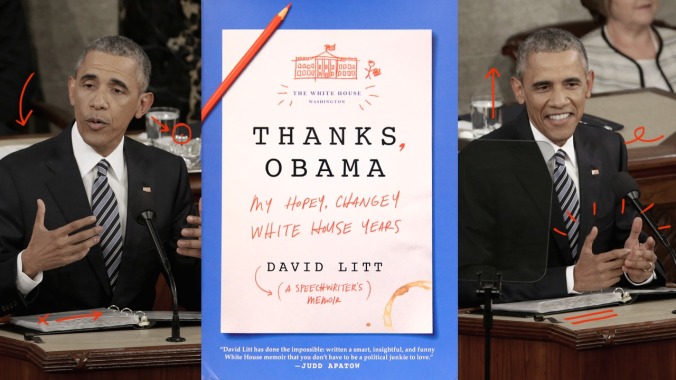Thanks, Obama takes readers back to a White House when the president was funny, not a joke
Aux Features Book Review
David Litt thought Donald Trump had been firmly defeated in 2011. Litt worked on Barack Obama’s monologue for that year’s White House Correspondents’ Association Dinner, which included a section lambasting the leader of the birther movement. He wrote about his experience watching those jokes delivered as part of his memoir, Thanks, Obama: My Hopey, Changey White House Years.
During the section on Trump, hundreds of Democrats and Republicans joined in bipartisan, mocking laugher. As the crowd applauded the president, the humiliated billionaire turned as red and angry as a blister. Well, I remember thinking, that’s the end of this guy.
That was far from the only mistake he’d make during his tenure as a White House speechwriter. He’d infuriate Kenya by lumping it in with Syria because the similar-sounding names made a sentence flow; he nearly tripped over Obama while attempting a The West Wing-style walk and talk in the actual West Wing; he’d be surprised to learn that the silver key that senior staffers carried around got them into an exclusive gym and not a disaster bunker. He’d also come to understand a fundamental truth about the president he served for almost eight years: “POTUS was brilliant. He was talented. He was on the right side of history. But at the end of the day, Barack Obama was just a guy.”
Litt began campaigning for Obama after his 2008 Iowa primary victory with the zealousness of a religious fanatic, but would join much of the nation in being unable to rally the same enthusiasm for President Obama as he did for candidate Obama. He pinpoints his exact moment of disillusionment to Obama’s poor performance in his first presidential debate against Mitt Romney, but he’d also find cause for despair in the president’s handling of the standoff with congressional Republicans over the raising of the debt ceiling and the failed launch of healthcare.gov. He recognizes one of the reasons none of his fellow West Wing staffers could have steered the administration away from such pitfalls as the same reason he almost let burning plastic drip onto Obama’s head during a video recording—a belief within the president’s team that “straying outside your lane was a mortal sin.”
But Thanks, Obama is far from an indictment of Obama’s presidency. Litt shares the emotional roller-coaster of living through the administration’s victories and defeats. He was irate that a joke he wrote about Osama Bin Laden for the White House Correspondents’ Association Dinner was cut but was grateful he hadn’t fought harder to keep it when he learned the reason why—Obama would announce that the leader of Al-Qaeda had been killed less than a week later. In one particularly touching scene, Litt helps his girlfriend navigate the still buggy healthcare.gov to sign her up for insurance, triggering a major fight that ends in reconciliation when she finally gets an insurance plan.
While his first White House niche was writing about Jewish issues, which led him to a meeting with Obama explaining why Passover sounded like “kind of a downer” and trying to teach the president to pronounce “chag sameach,” Litt would end up finding the most success when it came to jokes. That meant working on numerous White House Correspondents’ Association Dinner speeches along with some of the president’s less traditional comedic efforts like his appearance on Between Two Ferns and in the Buzzfeed video “Things Everybody Does But Doesn’t Talk About.” Litt did work on significant policy speeches, like the one that Obama made on criminal justice reform just a week after the racially motivated mass shooting in Charleston, South Carolina. But he may be most proud of arranging to have Keegan-Michael Key play Luther—Obama’s anger translator as envisioned on Key & Peele—alongside the actual president (and, for the same event, helping the president avoid cracking up on stage).
Litt’s knack for humor shines throughout the book, which is packed with laugh-out-loud anecdotes like the time he got caught in his underwear in the Air Force One coat closet or stories of dealing with the surly stray cat a member of the Secret Service fed outside the Eisenhower Executive Office Building. There’s also some gallows humor, as writing from the age of “alternative facts,” he looks back on his epic battles with hyper-vigilant editors checking his speeches for things that couldn’t be confirmed. But he never gets drawn too far into lamenting the Democratic Party’s failings or the rise of Trump. Litt left the White House in January 2016 to work for Funny Or Die, so there’s no talk about the 2016 election. There will be more than enough memoirs written about that.
Thanks, Obama’s epilogue takes place a month after Trump’s inauguration, with Litt playing a game he calls “How much worse is America since I last checked my phone.” But even as Trump tries his best to destroy Obama’s legacy, Litt is confident it can survive. That may be the same kind of idealistic thinking that once led him to believe that Obama “was the best possible version of a human,” but for readers playing that same game, a bit of hope and nostalgia is a powerful thing.